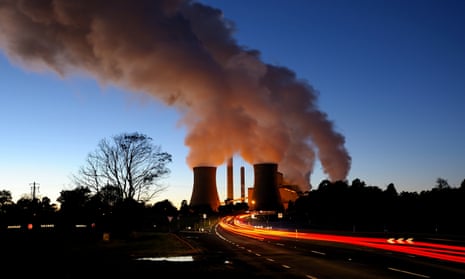European, British and American diplomats have met up to three times in Canberra over recent months to discuss how to encourage Australia to consider stronger cuts to its greenhouse gas emissions.
Guardian Australia can reveal diplomats from like-minded countries have been talking about how they could engage in dialogue with Australia, aimed at lifting its level of climate ambition ahead of a crucial international conference in November.
In addition to pursuing engagement with the Australian government, possible options include outreach to business associations and farming groups.
The most recent meeting, held on Thursday last week, brought together the ambassadors, high commissioners or deputy heads of mission of the UK, the US, the European Union, Denmark, France, Italy, Germany, Canada, Sweden and Switzerland.
The talks come as the Morrison government faces growing calls, both within Australia and internationally, to formally commit to net zero by 2050 and to strengthen its 2030 target, which remains at the Abbott government-era level of a 26-28% cut in emissions compared with 2005.
Diplomatic sources in Canberra described the meetings as “networking and outreach events” among like-minded countries.
One source said the participants were looking for ways to “nudge” Australia towards strengthening its pledges, including the medium-term target, given the coming decade is considered vital to keeping within reach the Paris goal of limiting heating to 1.5C above pre-industrial levels.
But another source familiar with the talks said they were aimed at fostering dialogue with Australia.
The meetings have been organised by the UK, which as the host of Cop26 in Glasgow in November is seeking to rally all countries to strengthen their commitments.
The British high commissioner, Vicki Treadell, tweeted on Friday night in vague terms about the latest meeting, saying it was “a pleasure to gather likeminded colleagues to compare notes” on climate action – but until now the focus of the talks has not been reported.
With 100 days to go to #COP26 it was a pleasure to gather likeminded colleagues to compare notes on #ClimateAction. #TogetherForOurPlanet 🌏
— VickiTreadell (@VickiTreadell) July 23, 2021
🇺🇸🇩🇰🇪🇺🇫🇷🇮🇹🇩🇪🇨🇦🇸🇪🇨🇭🇬🇧 pic.twitter.com/oGRlBazgBv
When approached for comment about the Canberra meetings, a spokesperson for the UK government said: “As president of Cop26 … the UK continues to work with all parties on our shared ambition for Cop in less than 100 days.
“Accelerating collaboration is a key Cop26 goal and ensuring a successful outcome is our shared responsibility.”
The US – which under the Biden administration has vowed to weave the climate crisis into the fabric of all of its diplomatic engagements – is also understood to be playing an active role in the talks.
A spokesperson for the US embassy said: “We regularly meet with our Australian and diplomatic contacts on our shared ambition to address climate change.”
The US spokesperson added: “None of us can do this alone. Working together to develop and invest in green technologies will play a big role in tackling the climate crisis, as will setting new, more ambitious climate goals.”
A spokesperson for the EU said it “participates in regular discussions with many stakeholders about the need for all nations to take more ambitious climate action”.
The prime minister, Scott Morrison, has repeatedly said his government wants to achieve net zero emissions as soon as possible, and preferably by 2050 – but to date has stopped short of making a firm commitment. He faces pushback from his junior Coalition parter, the Nationals.
“Well, we are working on a plan as to how that [net zero] could be achieved, because in Australia, people like to know what it will cost and how you’re going to get there,” Morrison told Triple J’s Hack program last week.
The Australian government has repeatedly promoted a “technology not taxes” approach to climate policy. On the sidelines of the G7 summit in Cornwall last month, Morrison inked deals with Japan and Germany to develop technology to help reach “a net zero emissions future”.
But the Biden administration has previously expressed public concerns about the trajectory of Australia’s emission reduction pledges and implied that technological development, while important, was insufficient on its own.
Mike Goldman, the chargé d’affaires at the US embassy, has indicated both Australia and the US needed to set “more ambitious climate goals”.
In February Joe Biden’s climate envoy, John Kerry, publicly acknowledged past “differences” between the US and Australia in tackling the climate crisis while calling for a faster exit from coal-fired power.
Earlier this week the UK’s president-designate of the Cop26 summit, Alok Sharma, expressed disappointment that a two-day meeting in London had failed to secure agreement from every country to phase out coal-fired power.
Ministers from more than 50 countries agreed to limit global heating to 1.5C, but Sharma said: “Unless we get all countries signed up to a coal phase-out, keeping 1.5C in reach is going to be extremely difficult.”
